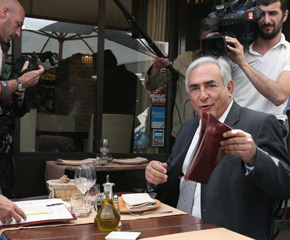A new research centre dubbed the “restaurant of the future”, at the Dutch university of Wageningen hopes to help answer these questions and more by tracking diners with dozens of unobtrusive cameras and monitoring their eating habits.
“We want to find out what influences people: colours, taste, personnel. We try to focus on one stimulus, like light,” said Rene Koster, head of the Centre for Innovative Consumer Studies, as overhead bulbs switched through green, red, orange and blue.
“This restaurant is a playground of possibilities. We can ask the staff to be less friendly and visible or the reverse,” he said. “The changes must be small. If you were making changes every day it would be too disruptive. People wouldn’t like it.”
The stylish new facility has glass walls, black marble countertops, a polished bamboo floor and self-service tills which allow diners to scan their lunch while they and their trays are weighed by a set of scales built into the floor.
University staff who want to eat at the new restaurant have to sign a consent form agreeing to be watched.
Big Brother is watching
From a control room, researchers can direct cameras built into the ceiling of the restaurant to zoom in on individual diners and their plates. They watch how people walk through the restaurant, what food catches their eye, whether they always sit at the same table and how much food they throw away.
“You’re already watched by cameras everywhere so what difference does it make here?” said Bert Visser, a plant scientist. “Presentation really influences what you choose.”
Unconscious choices
Koster said researchers can experiment with variables like noise, smells, furniture and food packaging. Is the same ham and cheese sandwich more appealing if it is wrapped in cellophane, under a glass cover or on offer in a vending machine?
The kitchen staff are also being spied on, cameras watch how they work with new gadgets like adjustable work benches and cleaning hoses: “It’s not to see if they are working hard but how they are working,” Koster said.
Koster wants to experiment with how to reduce food wastage and encourage people to sort leftovers into a biogas generator, perhaps by telling them how much energy they are saving.

